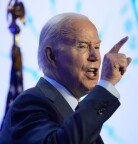Former presidents memoir cannot trigger political conflicts
Former presidents memoir cannot trigger political conflicts
Posted January. 31, 2015 08:05,
Controversy over "Presidents Time," a memoir written by former President Lee Myung-bak, has developed into a feud between the former administration and incumbent administration. The presidential office Cheong Wa Dae said it is regrettable that the former president viewed in his memoir then-Grand National Party Rep. Parks opposition against Sejong City project revision in 2009 as an attempt to hold Jeong Un-chan in check, who was then-most promising political figure. In the midst of unsettled issues around the state affairs, a conflict between the former and the current administrations makes the public uncomfortable.
Although Lee said, I wrote the memoir for future administrations to take reference from the past to help maintain consistency in state policies, there are several topics in the memoir that the former president didnt totally focus on policies. It was not a prudent behavior for the former president to publish what he guessed Park would have in mind on the Sejong City project, which divided the public opinion at that time. It is widely known that Lee and Park have not been on good terms each other, which started from the party primary for the 2007 election. It is not appropriate for national leaders to have a tit-for-tat over the past issues. Rather, they need to follow the suit of American former and current presidents who collaborate for bipartisan national causes.
It is not easy to understand why Lee has to praise and speak good of major policies pursued during his term in office such as the four-river project or resource diplomacy. Especially, self-admiration and justification for resource diplomacy deserves criticism that it is a proactive safeguard against attacks expected from the opposition parties since the National Assembly investigation is around the corner. The memoir also disclosed some untold stories around the inter-Korean summit and behind-the-scene contacts between the two Koreas. This may put pressures on the inter-Korean relations in the future. Disclosure of conversation with then-Chinese Premier Wen Jiabao can be an issue in the same vein.
On the publication timing, Lee and his aides argue that the book has been prepared since May 2013. However, it remains unclear whether it is a sheer coincidence to publish a controversial book in the politically sensitive period. Regarding Cheong Wa Daes expression of regret, Lee responded, Politically sensitive issues were all censored, which sounds like a warning message against the current administration.
Lees memoir is beneficial since it can deliver lessons-learned and experiences in the state affairs to the future generation. However, if the memoir downplays the current administrations stance in diplomacy and national security, saying, The Park administration doesnt seem to know the area well, it may not be easy for the current administration to regard the comment as good-willed advice. Discord over the memoir shows that Lee and Park administrations didnt make much effort for mutual communication despite regaining power for two administrations in a row. For consistency in the state affairs, it would be better to have dialogues, not publishing a book to the public.







